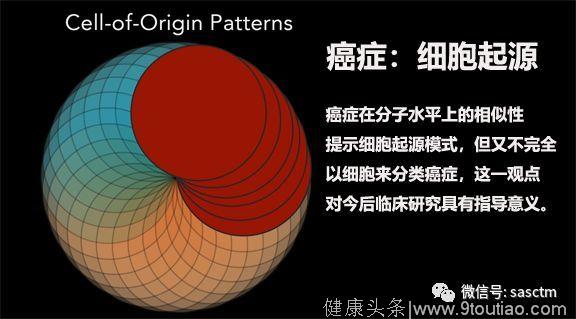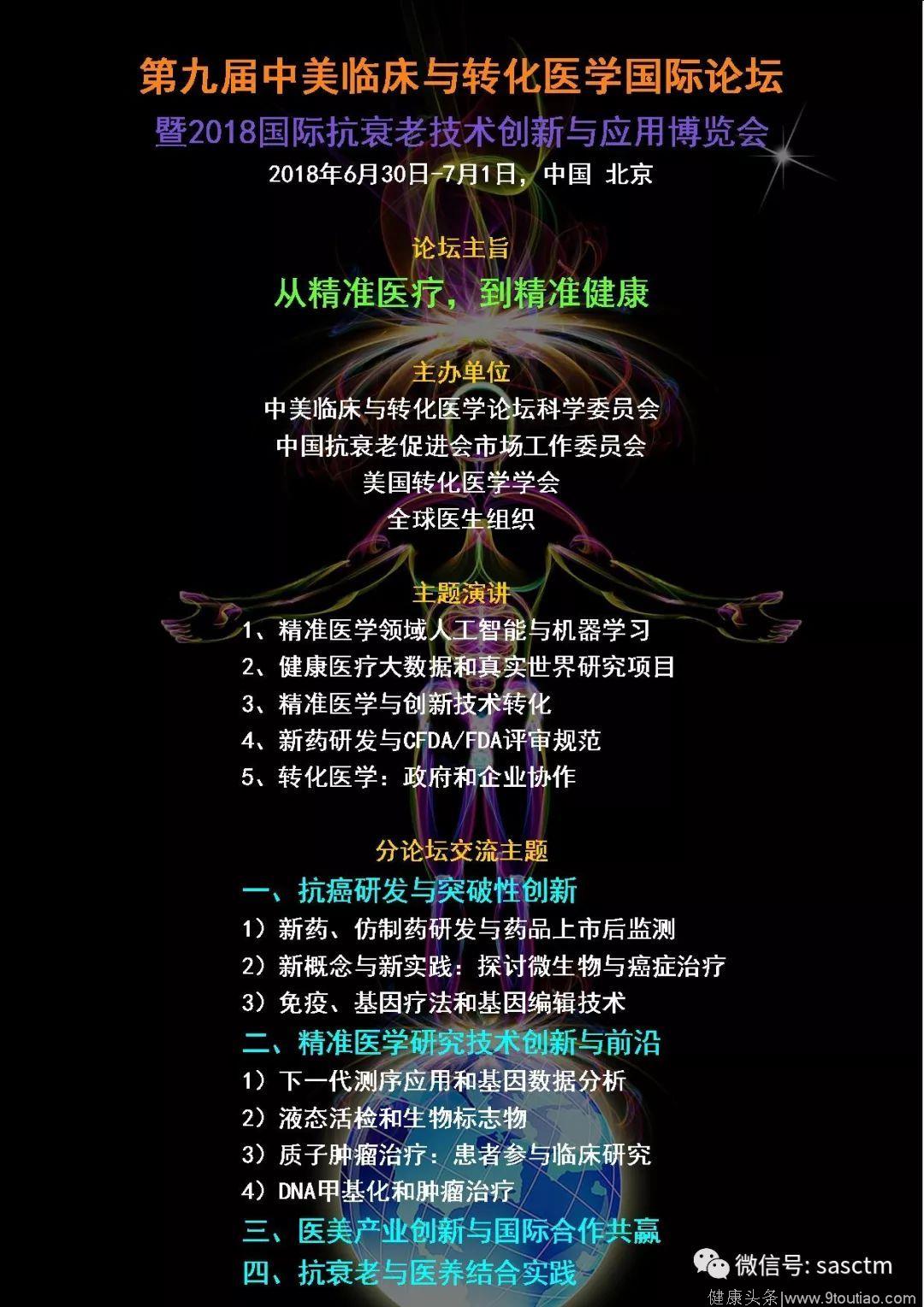

图中紫兰色细胞是癌细胞,粉红色细胞是正常细胞。
图示癌细胞通过循环系统扩散至身体其他部位的过程。
日前,美国国立卫生研究院首次发布了“泛癌症图谱”(PanCancer Atlas),并以27篇论文集形式发表在《细胞》。
该成果是历经10年完成的癌症基因图谱系统性研究总结,补充了基于TCGA项目发表的30多篇肿瘤的研究论文,拓展了“泛癌症研究报告”。NIH院长和业界同仁赞叹此为“巅峰之作!”
日前,由美国国立卫生研究院(NIH)资助的“泛癌症图谱”(PanCancer Atlas)项目首次公布了研究成果:研究人员完成了来自33种不同类型肿瘤的1.1万例患者详细的肿瘤基因测序及分析。“绘制”出了部分癌症全面、多维的基因组变化图谱。
NIH院长Collins博士认为,正如业界所期盼的那样,该项成果堪称是十多年来开创性癌症研究的“巅峰之作”!
该项研究成功地为肿瘤专家和临床医生全面而透彻地诠释了癌症发病机理,包括癌症如何发生、生长部位以及为何发生?与此同时,也有助于今后更好地收集抗癌药物临床试验数据信息和未来精准治疗方案的选择。
具里程碑意义的“TCGA”
泛癌症图谱的研究成果以27篇论文集形式发表在著名期刊《Cell》上。也是对已完成的癌症基因组图谱(The Cancer Genome Atlas , TCGA)的进一步补充和总结。
“TCGA”项目是由美国国家人类基因组研究所(NHGRI)和美国国家癌症中心(NCI)联合发起并支持的多中心协作项目,这两家牵头机构隶属于NIH。“TCGA”项目经费多达3亿美元,包括北美20多家机构的150名科研人员参与项目。
“TCGA”作为国际癌症基因组联盟机构最大的研究项目,也是肿瘤转化研究领域最大的数据库。
NHGRI基因组学部主任兼TCGA项目负责人Hutter博士认为,“TCGA”是第一个精准研究项目,在基因分子水平上全面总结了多种癌症特征。
10年前,该项目启动时还处于起步阶段,收集的数据不足以支撑如此大规模的基础研究,以至于无法在基因分子水平上给各类癌症“画像”以及分析其机理。这在当时也是颇具野心的宏伟计划。
NCI——TCGA项目负责人Zenklusen博士指出“泛癌症图谱”旨在补充过去10年来基于“TCGA”项目研究成果发表的30多篇与肿瘤相关的论文,并且最终拓展了2013年早期发表的“泛癌症研究报告”。
“泛癌症图谱”项目不仅关注癌症基因组测序,还关注不同类型数据的对比分析,例如研究基因与蛋白质表达谱,并将其与临床表观和影像检查数据进行关联性对比。
三种类别研究成果
泛癌症图谱项目被分为三大类别,每种类别都由一篇总结性论述对其核心内容进行概括和引申讨论,核心主题内容包括:癌细胞起源、致癌过程和途径以及癌细胞信号传导通路等。多篇同期论文发表了对三大类别中的其他主题也进行了深入挖掘和探讨其研究成果。
在第一篇论述中,作者通过应用分子聚类分析技术,对基因测序结果分析进行总结。此分析技术主要是通过设置基因表达、癌症细胞染色体数目异常和DNA修饰等参数来对癌症进行分组(分类)。
此篇论述的研究结果表明,癌症类型是由其可能的起源细胞决定。此结论加深了我们对癌症组织起源影响癌症特征的认识,便于我们针对各种癌症类型采取更恰当和精准的临床治疗方案。

第二篇论述概述了“TCGA”在导致癌症发展和进展过程中的重要成果。作者特别指出发现了三个关键性“致癌因素”:
- 突变,包括胚系突变(遗传性)和体细胞突变(获得性);
- 癌症的潜在基因组和表观基因组对基因和蛋白表达的直接和间接影响;
- 癌症和免疫细胞的相互作用。
这些研究成果将有助于为各种癌症的创新疗法和免疫疗法排序出应用的优先级别。

最后一篇论述详细介绍了“TCGA”对控制细胞周期、细胞死亡和细胞生长信号通路基因组改变的研究,揭示了这些过程在一系列癌症中的异同。这些可以成果也揭示了癌症发生发展中所存在的缺陷。这将有助于开发联合疗法和个性化医疗方案。

所有关于“泛癌症图谱”发表的研究成果和论文都可以通过《Cell》官网上获得。此外,随着长达十年的“TCGA”项目的正式结题,该项目组牵头机构预期计划举办一个为期3天的专题学术研讨会,主题是“TCGA”的丰功伟绩:癌症多组学的精准研究。研讨会拟定2018年9月27-29日在华盛顿特区举行。
研讨会届时将着重探讨癌症研究的未来发展方向,并讨论“泛癌症图谱”的指导意义,与此同时,还将展示癌症基因组结构最新进展和近期靶向治疗进展等。
泛癌症图谱汇编的27篇论文
2018
The Integrated Genomic Landscape of Thymic Epithelial Tumors
Cancer Cell. Volume 33Issue 2: p244-258
2017
Comprehensive and Integrated Genomic Characterization of Adult Soft Tissue Sarcomas
Cell. Volume 171Issue 4: p950-965
Comprehensive Molecular Characterization of Muscle-Invasive Bladder Cancer
Cell. Volume 171Issue 3: p540-556
Integrated Genomic Characterization of Pancreatic Ductal Adenocarcinoma
Cancer Cell.Volume 32Issue 2: p185-203
Integrative Analysis Identifies Four Molecular and Clinical Subsets in Uveal Melanoma
Cancer Cell.Volume 32Issue 2: p204-220
Comprehensive and Integrative Genomic Characterization of Hepatocellular Carcinoma
Cell.Volume 169Issue 7: p1327-1341
Integrative Genomic Analysis of Cholangiocarcinoma Identifies Distinct IDH-Mutant Molecular Profiles
Cell Reports.Volume 18Issue 11: p2780-2794
Integrated Molecular Characterization of Uterine Carcinosarcoma
Cancer Cell. Volume 31Issue 3: p411- 423
Comprehensive Molecular Characterization of Pheochromocytoma and Paraganglioma
Cancer Cell. Volume 31Issue 2: p181-193
Integrated Genomic and Molecular Characterization of Cervical Cancer
Nature.Volume 543:p378-384
Integrated Genomic Characterization of Oesophageal Carcinoma
Nature.Volume 541:169-175
2016
Comprehensive Pan-Genomic Characterization of Adrenocortical Carcinoma
Cancer CellVolume 29Issue5: p723–736
Molecular Profiling Reveals Biologically Discrete Subsets and Pathways of Progression in Diffuse Glioma
Cell164Issue 3:p550-563
2015
The Molecular Taxonomy of Primary Prostate Cancer
Cell163Issue 4:p1011-1025
Comprehensive Molecular Characterization of Papillary Renal Cell Carcinoma
NEJM. 374:135-145
Comprehensive Molecular Portraits of Invasive Lobular Breast Cancer
Cell. 163Issue 2:p506–519
Genomic Classification of Cutaneous Melanoma
Cell. 161Issue 7:1681-1696
Comprehensive and Integrative Genomic Characterization of Diffuse Lower Grade Gliomas
NEJM. 372:2481-2498
Comprehensive Genomic Characterization of Head and Neck Squamous Cell Carcinomas
Nature. 517(7536):576-582
2014
Integrated Genomic Characterization of Papillary Thyroid Carcinoma
Cell. 159Issue 3:676-690
The Somatic Genomic Landscape Of Chromophobe Renal Cell Carcinoma
Cancer Cell. 26Issue 3:319-330
Multiplatform Analysis of 12 Cancer Types Reveals Molecular Classification within and across Tissues of Origin
Cell. 158Issue 4:929-944
Comprehensive Molecular Characterization of Gastric Adenocarcinoma
Nature. 513(7517):202-209
Comprehensive molecularprofiling of lung adenocarcinoma
Nature. 511(7511):543-550
Comprehensive molecular characterization of urothelial bladder carcinoma
Nature. 507(7492):315-22.
2013
The Somatic Genomic Landscape of Glioblastoma
Cell. 155(2):462-477.
Comprehensive molecular characterization of clear cell renal cell carcinoma.
Nature. 499(7456):43-49.
Integrated genomic characterization of endometrial carcinoma.
Nature. 497(7447):67-73.
Genomic and epigenomic landscapes of adult de novo acute myeloid leukemia.
NEJM.368:2059-2074.
2012
Comprehensive molecular portraits of human breast tumors.
Nature. 490 (7418):61-70.
Comprehensive genomic characterization of squamous cell lung cancers.
Nature. 489 (7417):519:525
Comprehensive molecular characterization of human colon and rectal cancer.
Nature. 487 (7407):330-337.
2011
Integrated genomic analyses of ovarian carcinoma.
Nature. 474 (7353):609-615.
2010
Identification of a CpG Island Methylator Phenotype that Defines a Distinct Subgroup of Glioma.
Cancer Cell. 17 (5):510-522
An integrated genomic analysis identifies clinically relevant subtypes of glioblastoma characterized by abnormalities in PDGFRA, IDH1, EGFR and NF1.
Cancer Cell. 17 (1):98-110
2008
Comprehensive genomic characterization defines human glioblastoma genes and core pathways.
Nature. 455 (7216):1061-1068



+

自家招贤纳士:
欢迎转发分享,微信平台等转载,请务必联系授权:sasctm告知。











